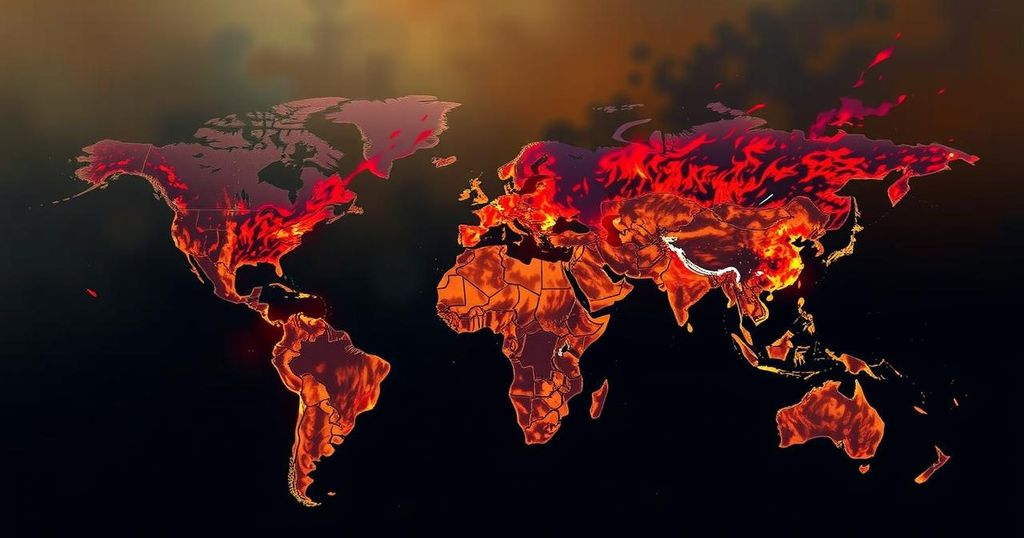Research Highlights Rising Global Wildfires and Health Risks Due to Climate Change
Research has demonstrated a direct connection between climate change and the increase in the frequency and severity of wildfires globally, leading to a surge in smoke-related deaths from fewer than 669 annually in the 1960s to 12,566 in the 2010s. Studies reveal significant regional variations, with some areas experiencing declining fires due to human activity, while others, such as California and Siberia, face a rise in wildfires exacerbated by climate factors. The effectiveness of human interventions is limited during extreme wildfire years, underscoring the urgent need for significant greenhouse gas reductions and enhanced fire management strategies.
Recent research has established a direct correlation between climate change and the escalating frequency and intensity of wildfires globally, leading to thousands of additional smoke-related fatalities in the past few decades. Two distinct studies conducted by research teams from Dalhousie University, Belgium, the UK, and Japan have examined the proliferation of wildfires and their associated impacts on human health, revealing adverse outcomes for both dimensions. Notably, the estimated annual deaths related to wildfire smoke rose dramatically from fewer than 669 in the 1960s to 12,566 in the 2010s. One significant study, published in Nature Climate Change, utilized models comparing wildfire incidents with and without climate change factors. The results indicated an alarming increase in the frequency and severity of wildfires, particularly in sensitive ecosystems within African savannas, Australia, and Siberia. Nonetheless, distinct regional disparities were noted; while Africa accounted for a significant portion of the global burnt area, it experienced a notable decline in wildfire occurrences, attributed to heightened human activities and land fragmentation—factors hindering the ability of fires to spread. In contrast, in forested regions like California and Siberia, wildfire incidences surged due to prolonged periods of drought and elevated temperatures linked to climate change. The importance of these findings is underscored by Dr. Sian Kou-Giesbrecht, an associate professor in Earth and Environmental Sciences at Dalhousie University, who stated that the research quantifies the influence of climate change on the escalation of global wildfires, especially considering the consequences on society and feedback loops to climate change. Using comprehensive models that examined various elements such as climate factors, vegetation types, and population density, the researchers determined that human interventions, such as fire suppression and landscape management, could mitigate fire effects to an extent. However, these strategies often prove insufficient in counteracting climate change’s impact, particularly in extreme weather events. Seppe Lampe, a climate scientist at the Vrije Universiteit Brussel, articulated that during periods of moderate wildfire occurrences, human interventions have significant effects, yet when wildfires are frequent, climate change’s influence prevails, leading to a loss of control. The simulations conducted revealed that climate change increased the global burnt area by nearly 16 percent from 2003 to 2019 and raised the likelihood of experiencing months with above-average global burned areas by 22 percent. Alarmingly, the contribution of climate change to the scorched areas escalated at a rate of 0.22 percent annually, especially pronounced in Central Australia. The studies advocate for immediate, substantial, and sustained reductions in greenhouse gas emissions coupled with effective landscape and fire management strategies to stabilize the adverse impacts on lives, livelihoods, and ecosystems. Moreover, the second paper published in the same journal highlighted that climate change has potentially raised the share of wildfire smoke-related fatalities tenfold over the last fifty years, a trend previously unquantified. Researchers, including those from the National Institute for Environmental Studies in Japan, adopted fire-vegetation models in conjunction with a chemical transport model and a health risk assessment framework to correlate global human mortality from fine particulate matter emissions from wildfires to climate change from 1960 to 2019. Their findings suggested that the climate change attribution for fire-related deaths surged from one to three percent in the 1960s to as high as 28 percent in the 2010s, significantly impacting regions such as South America, Australia, Europe, and the boreal forests of Asia. Dr. Kou-Giesbrecht emphasized the complexities in attributing wildfires to climate change; despite the challenges, the research supports robust attributions of wildfire occurrences to climate change through various models, indicating that if the current pace of climate change persists, the area of scorched land and corresponding health consequences will markedly escalate in the forthcoming decades.
Wildfires have become an increasingly prevalent issue, exacerbated by climate change, which has affected global weather patterns, resulting in more extended dry spells and elevated temperatures. This phenomenon has significant ramifications for human health, as smoke from wildfires contributes to respiratory issues and other health complications, leading researchers to investigate the correlation between climate change and increasing wildfire frequency and intensity. The scientific exploration further highlights how human interventions can mitigate fire damages but often fall short against the overwhelming forces of climate change.
The studies collectively illuminate a critical link between climate change and the rising incidence of wildfires, emphasizing a dramatic increase in smoke-related deaths attributed to these fires. The findings underscore the necessity for urgent global action to reduce greenhouse gas emissions and improve landscape and fire management practices to confront the escalating threat posed by climate change on wildfire occurrences and the associated health effects. The evidence presented calls for an acknowledgment of our loss of control over wildfires due to climatic factors, implicating the need for comprehensive strategies to safeguard human lives and ecosystems.
Original Source: www.dal.ca




Post Comment